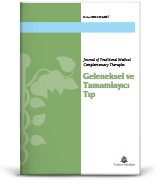Amaç: Bu çalışmada, tıp fakültesi öğretim üyelerinin geleneksel ve tamamlayıcı/entegratif tıp (GETAT)a ait bilgi ve tutumlarının araştırılması amaçlanmıştır. Kullanımı artan GETAT uygulamalarına öğretim üyelerinin bakış açılarının araştırılmasının önemli olduğunu ve tıp eğitimine katkıda bulunacağını düşünmekteyiz. Gereç ve Yöntemler: 2018-2019 eğitim öğretim döneminde tıp fakültesinde görevli öğretim üyeleri arasında yapılan kesitsel bir çalışmadır. Önceki çalışmalarda geçen sorulara benzer sorulardan oluşturulan bir anket formu kullanılmıştır. Bulgular: Katılımcıların 95 (%75,4)'i Türkiye'de GETAT uygulamaları hakkında bilgisi olduğunu, 76 (%60,32)'sı da ''alternatif'' diye adlandırmanın doğru olmadığını, 90 (%72)'ı geleneksel tıp uygulamalarının hastane, poliklinik, muayenehane gibi yerlerde yapılması gerektiğini belirtmektedir. Ayrıca katılımcıların 70 (%56,91)'i bu uygulamaların bilimsel olduğunu düşünmekte olup, 108 (%85,72)'i GETAT uygulayıcılarının tıbbi olarak iyi eğitilmiş olması gerektiğini, 95 (%75,4)'i kendisi vermemiş olsa da doktorun hastasının kullandığı geleneksel yöntemden beklenen yan etkilere aşina olması gerektiğini, 89 (%75,42)'u GETAT uygulamalarının faydalı olduğu bilimsel olarak kanıtlanırsa kliniğinde kullanacağını ifade etmiştir. Katılımcılardan 76 (%61,79)'sı GETAT'ın kendi tedavisi ile karıştırılmaması gerektiğini söylemektedir. Sonuç: Katılımcıların çoğu GETAT uygulamalarını alternatif olarak adlandırmanın yanlış olduğunu, bu uygulamaları profesyonel uygulayıcıların hastane, poliklinik gibi yerlerde yapmalarının doğru olduğunu belirtmişlerdir.
Anahtar Kelimeler: Tıp fakültesi; öğretim üyeleri; geleneksel tıp; tamamlayıcı tıp
Objective: This study aimes to investigate attitudes and knowledge of members of a medical faculty towards the general practice of Complementary and Alternative Medicine (CAM). We think that this investigation is crucial due to raising practice of CAM and will also provide insights to medical education. Material and Methods: This is a cross-sectional study held at 2018-2019 semester year on faculty members. A questionnaire that includes questions similar to questionnaires of previous studies is used. Results: Among the participants, 95 (75.4%) declared that they have knowledge of general CAM practice in Turkey, 76 (60.32%) argued that it is not correct to call CAM as ''alternative''. 90 (72%) argued that CAM practise should be performed in a hospital-like location. 70 (%56,91) declared that CAM is scientific, 108 (%85,72) thought that practicers of CAM should be medically educated, 95 (%75,4) thought that practicer should have information about side effects of CAM method that was previously applied to patient even if he didn't prescriced it. Also, 89 (75.42%) declared they will only use CAM if its benefits are proven. On the other hand, 76 (61.79%) argued that CAM should not be mixed with current medical practice. Conclusion: Most participants stated CAM should not be called ''alternative'' and should be performed by educated professionals in a clinical environment.
Keywords: Faculty of medicine; faculty members; traditional medicine; complementary medicine
- Aydın S. [WHO and the alternative adventure of medicine from tradition to global]. Sağlık Düşüncesi ve Tıp Kültürü Dergisi. 2012;22:8-11.
- Pearson NJ, Chesney MA. The national center for rcomplementary and alternative medicine. Acad Med. 2007;82(10):967. [Crossref] [PubMed]
- Tokaç M. [Academic approach to traditional medicine: GETTAM]. SD Sağlık Düşüncesi ve Tıp Kültürü Dergisi. 2013;28:82-5.
- Mollahaliloğlu S, Uğurlu FG, Kalaycı MZ, Öztaş D. [The new period in traditional and complementary medicine]. Ankara Med J. 2015;15(2):102-5. [Crossref]
- Yildirim Y, Parlar S, Eyigor S, Sertoz OO, Eyigor C, Fadiloglu C, et al. An analysis of nursing and medical students' attitudes towards and knowledge of complementary and alternative medicine (CAM). J Clin Nurs. 2010;19(7-8):1157-66. [Crossref] [PubMed]
- Cowen VS, Cyr V. Complementary and alternative medicine in US medical schools. Adv Med Educ Pract. 2015;6:113-7. [Crossref] [PubMed] [PMC]
- Chaterji R, Tractenberg RE, Amri H, Lumpkin M, Amorosi SBW, Haramati A. A large-sample survey of first- and second-year medical student attitudes toward complementary and alternative medicine in the curriculum and in practice. Altern Ther Health Med. 2007;13(1):30-5. [PubMed]
- Frank E, Ratanawongsa N, Carrera J. American medical students' beliefs in the effectiveness of alternative medicine. Int J Collaborative Res on Internal Med Public Health. 2010;2(9):292-305.
- Münstedt K, Harren H, von Georgi R, Hackethal A. Complementary and alternative medicine: comparison of current knowledge, attitudes and interest among German medical students and doctors. Evid Based Complement Alternat Med. 2011;2011:790951. [Crossref] [PubMed] [PMC]
- Erci B. Attitudes towards holistic complementary and alternative medicine: a sample of healthy people in Turkey. J Clin Nurs. 2007;16(4):761-8. [Crossref] [PubMed]
- Featherstone C, Godden D, Gault C, Emslie M, Took-Zozaya M. Prevalence study of concurrent use of complementary and alternative medicine in patients attending primary care services in Scotland. Am J Public Health. 2003;93(7):1080-2. [Crossref] [PubMed] [PMC]
- Ergin A, Hatipoğlu C, Bozkurt Aİ, Mirza E, Kunak D, Karan C, et al. [Knowledge and attitudes of residents and medical students on complementary-alternative medicine]. Pamukkale Med J. 2011;4(3):136-43.
- Baugniet J, Boon H, Ostbye T. Complementary/alternative medicine: comparing the view of medical students with students in other health care professions. Fam Med. 2000;32(3):178-84. [PubMed]
- Altan S, Rahman S, Çam S. [The Knowledge and attitudes of the faculty of medicine students about complementary and alternative medicine methods]. Turkiye Klinikleri J Med Ethics. 2014;22(3):81-8.
- Akan H, Izbirak G, Kaspar EÇ, Kaya ÇA, Aydin S, Demircan N, et al. Knowledge and attitudes towards complementary and alternative medicine among medical students in Turkey. BMC Complement Altern Med. 2012;12:115. [Crossref] [PubMed] [PMC]







.: Process List